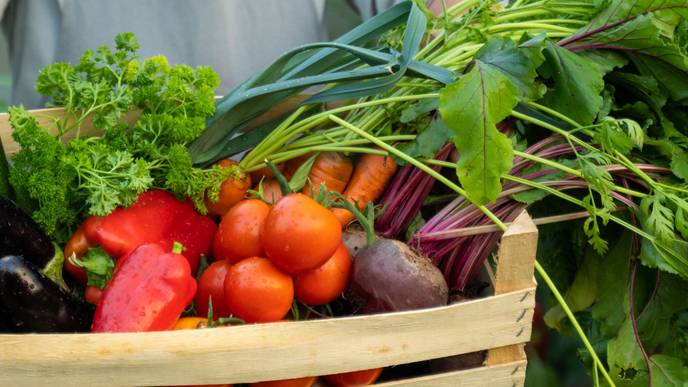Study Finds Clinic-Based Community Program Improved Food Security and Health

10/13/2023
The FISH (Food Insecurity and its Sequalae on Health) Study, led by Tiffany Wesley Ardoin, MD, FACP, Assistant Professor of Clinical Medicine at LSU Health New Orleans' Baton Rouge Regional Campus, reports that a clinic-based community program improved food security scores, healthy eating behaviors, and depression scores in a vulnerable, food-insecure population in Baton Rouge, Louisiana. The findings are published in the journal, Nutrients.
The collaborative Geaux Get Healthy Clinical Program, created in 2020 and directed by LSU Health's Dr. Wesley Ardoin at a North Baton Rouge Our Lady of the Lake clinic where she practices, provides comprehensive education and access to resources while leveraging community partnerships and a clinical setting as an intervention to improve food insecurity.
"This program has been a long time in the making and is the result of collaboration between LSU Health New Orleans' Baton Rouge Regional Campus, Our Lady of the Lake Regional Medical Center, local Baton Rouge government, large organizations such as American Heart Association and local community-based organizations," notes Dr. Wesley Ardoin. "It is unique in that we don't just give food or money to people, but we provide education and access to resources to promote sustainable change."
The Geaux Get Healthy Clinical Program includes in-person, hands-on cooking classes, a nutrition class, and a grocery store tour using the American Heart Association Healthy for Life Curriculum. The curriculum was enhanced to be more health-literate and culturally relevant based on feedback from participants and team members. The classes included both group education and hands-on guidance with floating community volunteers. Participants are encouraged to bring one family member or friend for support.
Educational topics include sodium and sugar restrictions in relation to hypertension and diabetes, portion control, food safety, chopping skills, eating seasonal produce, etc. The cooking and nutrition classes took place at the clinic, and the grocery store tour occurred within a Dollar General outfitted with fresh produce adjacent to the clinic.
The FISH study is a prospective cohort that studies the effects of the Geaux Get Healthy Clinical Program. The design is a one-group, pre-post evaluation over two years. FISH eligibility included English-speaking Geaux Get Healthy Clinical Program participants aged 18–65 years. All study participants were food insecure.
They had all scored at least a 2 on the USDA U.S. Adult 6-question Screening Module to qualify for the program. A total of 57 research participants with food insecurity completed the program. Mean food security scores improved at the completion of program, and these scores further improved 6 months after enrollment.
"This work is timely as the White House and the American Heart Association have both made big announcements within the last year on ways they want to address Food Insecurity in the United States," adds Dr. Wesley Ardoin. "Food Insecurity has a 14% prevalence in Louisiana and is directly related to many chronic medical conditions. We hope that this work can be a starting point for future research that can pave the way for programming that will promote healthy eating and improve health in Louisiana and beyond."
Food insecurity is significantly associated with many health conditions and poor health outcomes. While it is directly linked to body fat, it is also associated with depression, anxiety, hyperlipidemia, diabetes, and hypertension independent of the body mass index (BMI).
One study found that households with significant food insecurity had a higher incidence of hypertension (36.1%) compared to those without food insecurity (19.7%). Food insecurity is also correlated with an increased risk of chronic health conditions such as coronary heart disease, hepatitis, stroke, cancer, asthma, COPD, and chronic kidney disease.
The authors write, "Addressing food insecurity is complex due to the diverse range of factors contributing to its fluctuating nature, spanning from the production and distribution of food to individual challenges such as living in a food desert, financial constraints, or lack of knowledge and resources when purchasing and preparing nutritious meals. To date, there is no standardized design for programs addressing food insecurity."
With the improvement in food insecurity and nutrition behaviors, the Geaux Get Healthy Clinical Program may serve as a model for other programs addressing food insecurity in the future.
More information: Tiffany Wesley Ardoin et al, The Design and Impact of a Clinic-Based Community Program on Food Insecurity, Healthy Eating Behaviors, and Mood, Nutrients (2023). DOI: 10.3390/nu15204316
Citation: Study finds clinic-based community program improved food security and health (2023, October 12) retrieved 12 October 2023 from https://medicalxpress.com/news/2023-10-clinic-based-community-food-health.html
This document is subject to copyright. Apart from any fair dealing for the purpose of private study or research, no part may be reproduced without the written permission. The content is provided for information purposes only.

Facebook Comments